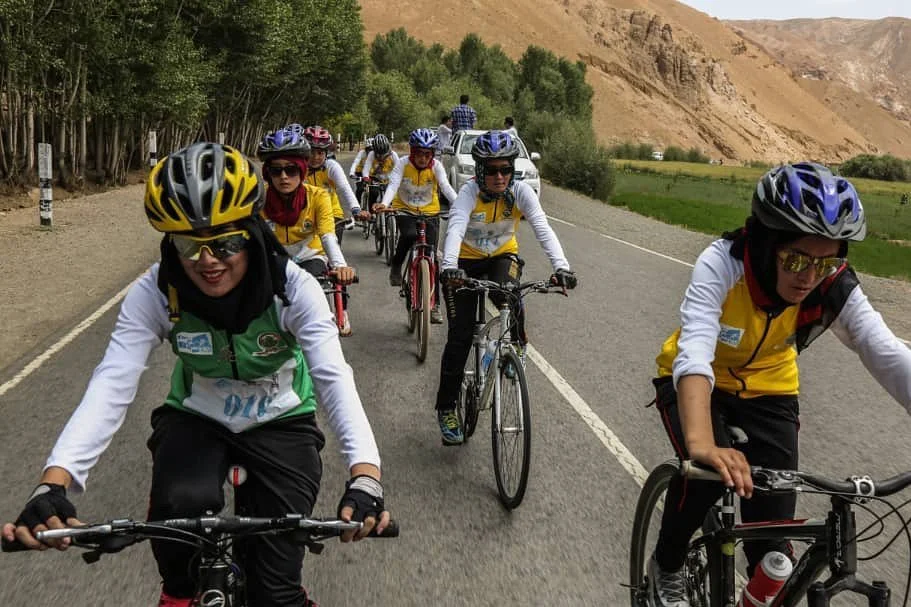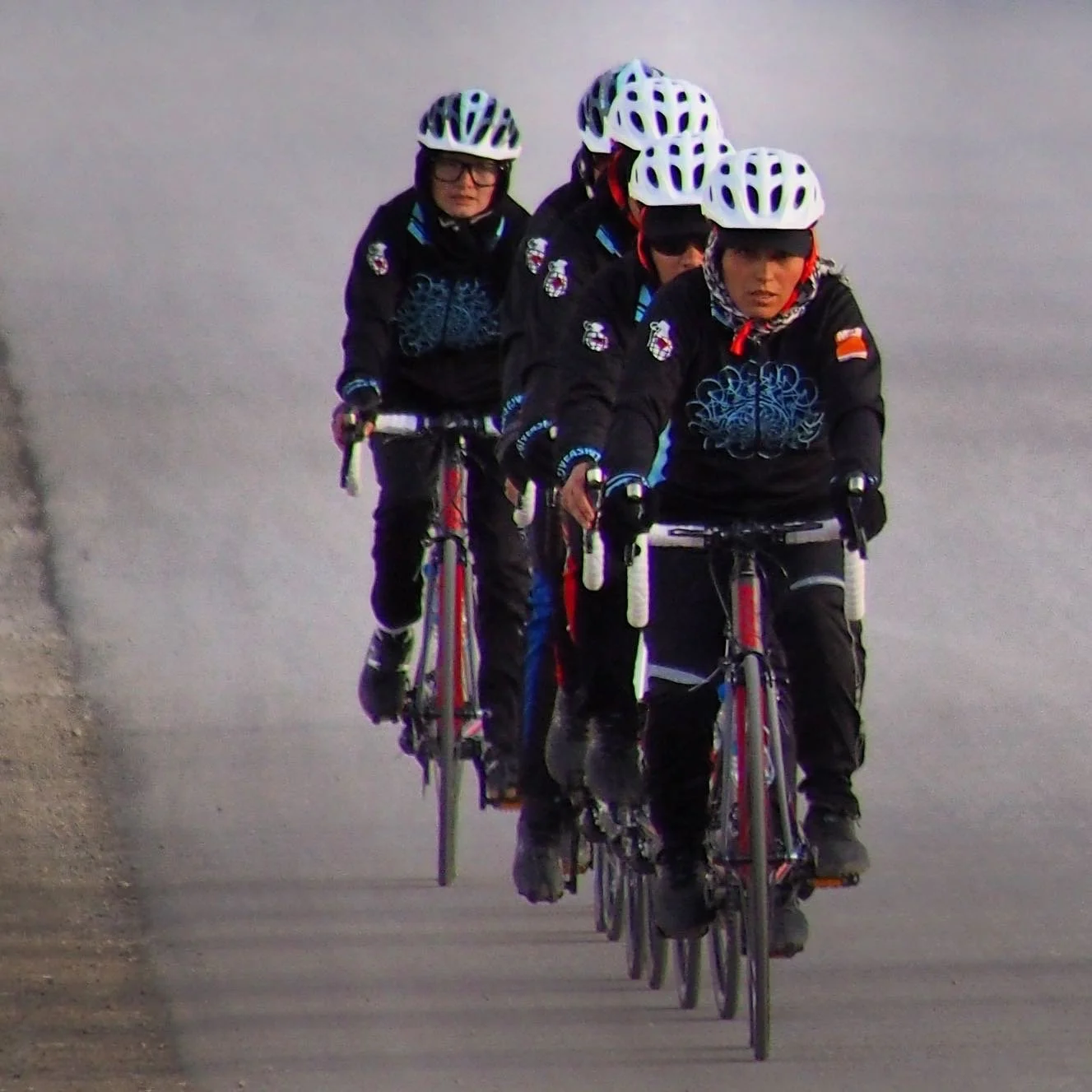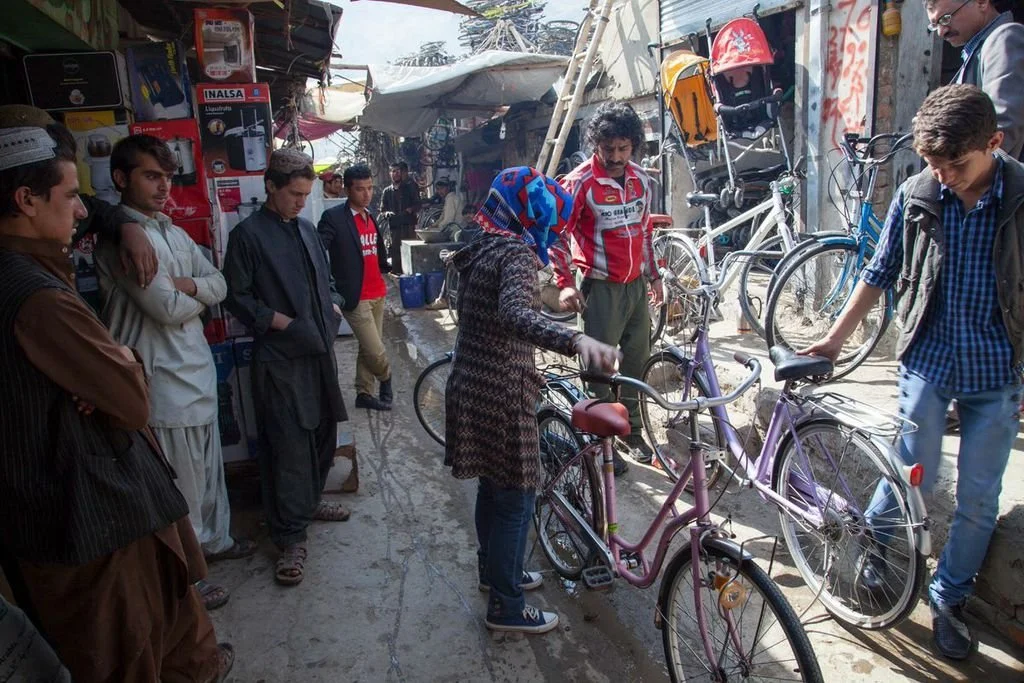
Women’s Cycling Archive Project
Preserving the legacy of Afghan women and girls who changed history on two wheels so that future generations will know their stories.
Afghan women began cycling in Afghanistan in 2011 in Kabul and Bamyan. By the end of 2013, there were two women’s teams and at least one cycling club. Women’s cycling had arrived in Afghanistan for the first time in Afghanistan’s history. Despite cultural taboos, threats, harassment, and a lack of infrastructure, cycling thrived. Women pedaled to claim their equal place in the streets. Just like generations before them had around the world.
When the Taliban returned to Kabul in August 2021, a decade later, there were over 200 women across seven provinces officially registered as cyclists with the Afghan Cycling Federation. There were road cyclists, BMX riders, mountain bikers, and girls who rode their bikes to get to school and in social justice protests. Hundreds, if not thousands, more had learned to ride at home, with independent teams and clubs, or at school. In the span of just one decade, women and girls challenged the taboo of cycling and achieved significant victories.
Afghan women cyclists were recognized for their bravery challenging gender barriers. They were nominated for the Nobel Peace Prize and as National Geographic Adventurers of the Year in 2015. Numerous films, books, magazine and newspaper articles covered their stories. Two museums included the story of Afghan cycling in exhibitions. Afghan women showed the world that bikes were more than sport, and showed their country that they a source of pride and inspiration regardless of racing. It wasn’t until they were forced to flee their county that the first cyclist would race on the world stage, as a member of the Refugee Olympic Team at the Tokyo Olympics in 2021. Three years later, two women, sisters, would race under the tri-color Afghan flag for the first time at the Paris Olympics.
At a time when the rule of gender apartheid oppresses the daily life of women and girls living in Afghanistan, the Afghan Women’s Cycling Archive Project ensures that the history and stories of these revolutionary women are not erased or destroyed. The women who began riding bikes for equal rights in the streets and for sport changed Afghan society and culture. History is a vital link for future generations to understand the truth of their story.
Imagine an archive where every woman’s story is collected, bound, and presented an an individual book.
The archive is a 5 year project collecting oral histories from the cyclists and witness statements from the those who met them, supported them, and witnessed their journey. We are building a physical archive of the extensive film, photography, media, and audio interviews that documented Afghan cyclists, mountain bikers, and BMX riders. We are also collecting as many artifacts as possible to preserve for future generations. Many have been lost due to the evacuations, but that is part of the recovery process.
If every life is its own universe, then the least that we can do as an archive is recognize the individuality of each woman beyond the sport. The archive is a living, breathing physical space as unique as the women themselves. a place to hold history for future generations and to hold space for continued research and storytelling in the present.
The Afghan National Cycling Team
Founded in 2011 in Kabul. The National Team operated under the Afghan Cycling Federation. For several years, the national team doubled as the Kabul team as there was no formally recognised women’s provincial teams. The women raced against their peers in Pakistan and India due to ease of traveling between the countries, and cyclists like team captain, Marjan Seddiqe were among the first Afghan women to race at internatinally at major competitions in countries like Kazakstan. Options to compete were limited due to difficulty of gaining travel visas.
The team was chosen as National Geographic Adventurers of the Year and nominated for the Nobel Peace Prize in 2015.
Masomah Alizada claimed asylum with her family in France in 2017 and raced with the Olympic Refugee Team at the Tokyo Olympics in 2021. Her race was overshadowed by the Taliban takeover of Afghanistan and the beginning of the evacuations. Masomah became the Chef de Mission of the Olympic Refugee Team for the Paris Olympics and has become a prominent spokesperson for refugee athletes.
Yulda and Fariba Hashimi were evacuated to Italy in 2021 and became the first Afghan women to race under the Afghan flag at the UCI World Cup in Glasgow in 2023 and the Paris Olympics in 2024.
Bamyan Women’s Cycling
The women’s cycling revolution in Bamyan started with one woman. Zahra Hussaini. She learned to cycle in Iran, and when she returned to Bamyan, she began teaching her peers to ride. She entered races against men, hiding her identity. She co-founded the first bike team in Bamyan with her best friend, Zakia Mohammadi. Team Shahmama was named after the female Buddha overlooking the valley, blown up by the Taliban. Together, they grew the sport and normalized the culture of girls on bikes. Their team was the first women’s founded and women’s bike team in Afghanistan’s history. They were challenged by local mullahs to stop cycling, but Zahra and Zakia met with the mullahs directly to gain their acceptance and continue riding. Women’s cycling expanded across the province, and the first women’s races occurred in Bamyan.
They opened the door for a generation of girls to follow through. When the Taliban arrived in Bamyan, Team Shahmama had already evolved past its founders. A new team, Team Oqab, had been formed by the next generation of riders. Dozens and dozens of young women flooded the streets in matching cycling kits. Training, racing, without any of the constraints that their predecessors had known.
Bike Clubs
Bike Clubs were formed by teenage girls in Kabul and Bamyan around the same time the Afghan National Women’s Cycling Team began training. The club in Kabul was founded by Fatima Haidari in 2013. That club lasted two years and then members formed new clubs in different parts of the city, including the co-ed Borderfree cycling club. Bikes were used in protests; climate justice, social issues, women’s rights,, and political.
By 2016, girl’s social clubs and after-school groups chose cycling as their ‘new skill’ and asked NGO’s for bicycle donations. NGO’s donated bikes to girls’ schools as transportation in rural communities.
Bike clubs may have existed prior to 2013, and prior to the first Taliban regime in the 60s and 70s - which is part of the archive’s research to complete the history of the Afghan women’s cycling. We know women’s cycling as a competitive sport didn’t exist before 2011, but we also know there are rare stories of Afghan women on bikes.
You can support the project in several ways.
Donate to help fund the first phase of oral history collection of the archive through our new crowdfunding campaign on Chuffed
If you want to become a sponsor or donate directly - donations can be accepted through our partner, The Tawana Organization. Please contact us for more information.
Follow and support the project on Patreon to help build our project and be part of the storytelling community. Online and in person storytelling and behind the scenes content.




